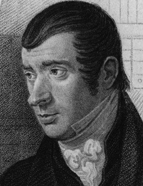

With the Vintismo period, José Liberato Freire de Carvalho returned to the kingdom, aware that he had contributed greatly to the new order. Elected as a member of parliament and continuing to influence public opinion with his Campeão Português em Lisboa [Portuguese Champion in Lisbon] (1822-1823), he saw the regime eroded by its own contradictions and destroyed following the Vila-Francada . Signing a declaration of protest, along with seventy-eight other representatives of the Sovereign Congress, Liberato became a front-line enemy of the counter-revolution, of the political projects of D. Carlota Joaquina and D. Miguel, the Prince exiled during the Abrilada [Aprilade] (1824), but appointed regent by D. Pedro IV (1827) and acclaimed and sworn in as king in 1828.
In Ensaio político sobre as causas que preparam a usurpação do infante D. Miguel no ano de 1828, e com ela a queda da Carta Constitucional do ano de 1826 [Political essay on the causes leading up to the usurpation of Prince Miguel in 1828, and with it the fall of the Constitutional Charter of 1826] (1840), Liberato took on what can only be understood as the role of a doctrinaire, after having played that of a political journalist. The very title of the book is indicative of a search for the political causes of what, for posterity and for the liberal tradition, will always be known as the Usurpation , thanks to the intervening role of some of the most important theoreticians of liberalism in Portugal, such as – in addition to Liberato himself – Luz Soriano, Herculano , and Garrett.
The author seeks to uncover the roots of this unique and symbolic event in Portuguese history, the Usurpation : he sees it as the culmination of a long tradition of struggle between the true national institutions, reinvigorated by Vintismo (the traditional courts established in Lamego) and their absolutist degeneration . This conflict, in his opinion, was fuelled both externally and internally by expansionism and the constant overt and unofficial interference of the London executives.
This work is financed by national funds through FCT - Foundation for Science and Technology, I.P, in the scope of the projects UIDB/04311/2020 and UIDP/04311/2020.
